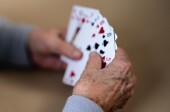 |
 |
 |
||
    |
||||
|
||||

'Near-Wins' Boost Desire to Keep Gambling
Brain sees these as special events, even though result is technically a loss|
|
HealthDay
By Robert Preidt
Wednesday, February 11, 2009
 WEDNESDAY, Feb. 11 (HealthDay News) -- A near-win in gambling stimulates a large portion of the win-related circuitry in the brain and boosts a person's motivation to gamble, according to British researchers.
WEDNESDAY, Feb. 11 (HealthDay News) -- A near-win in gambling stimulates a large portion of the win-related circuitry in the brain and boosts a person's motivation to gamble, according to British researchers.
They said their findings may also help explain why gambling attracts so many people and why some develop a gambling problem.
"We devised a series of experiments to elicit near-miss and control phenomena in the laboratory and used functional magnetic resonance imaging [fMRI] to explore the brain mechanisms underlying these cognitive distortions," senior study author Dr. Luke Clark, of the Behavioral and Clinical Neuroscience Institute at the University of Cambridge, said in a journal news release.
The researchers found that near-wins were associated with significant activation of the ventral striatum and anterior insula, areas that were also activated by wins. Clark and colleagues also identified a significant association between insula activity and problem gambling. Previous research has linked the insula with addictive behaviors.
Even though participants said near-wins were more unpleasant than outright losses, near-wins did increase their desire to keep gambling. But this was only true when the participant had control over arranging the gamble.
"Gamblers often interpret near-misses as special events, which encourage them to continue to gamble. Our findings show that the brain responds to near-misses as if a win has been delivered, even though the result is technically a loss," Clark said.
"By linking psychological and neurobiological accounts of gambling, these data inform our understanding of gambling behavior within society, and by extrapolation, the capacity of gambling to become addictive and pathological," Clark concluded.
The study was published in the Feb. 12 issue of Neuron.
HealthDay
Copyright (c) 2009 ScoutNews, LLC. All rights reserved.
Related News:
More News on this Date
Related MedlinePlus Pages:
| Home | Health Topics | Drugs & Supplements | Encyclopedia | Dictionary | News | Directories | Other Resources | |
| Disclaimers | Copyright | Privacy | Accessibility | Quality Guidelines U.S. National Library of Medicine, 8600 Rockville Pike, Bethesda, MD 20894 National Institutes of Health | Department of Health & Human Services |
Date last updated: 12 February 2009 |
